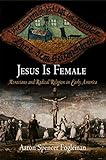Jesus Is Female : Moravians and Radical Religion in Early America / Aaron Spencer Fogleman.
Material type: TextSeries: Early American StudiesPublisher: Philadelphia : University of Pennsylvania Press, [2014]Copyright date: ©2007Description: 1 online resource (352 p.) : 8 color, 19 b/w illusContent type:
TextSeries: Early American StudiesPublisher: Philadelphia : University of Pennsylvania Press, [2014]Copyright date: ©2007Description: 1 online resource (352 p.) : 8 color, 19 b/w illusContent type: - 9780812220261
- 9780812291681
- 284/.67309033
- BX8566 ǂb F64 2007eb
- online - DeGruyter
- Issued also in print.
| Item type | Current library | Call number | URL | Status | Notes | Barcode | |
|---|---|---|---|---|---|---|---|
 eBook
eBook
|
Biblioteca "Angelicum" Pont. Univ. S.Tommaso d'Aquino Nuvola online | online - DeGruyter (Browse shelf(Opens below)) | Online access | Not for loan (Accesso limitato) | Accesso per gli utenti autorizzati / Access for authorized users | (dgr)9780812291681 |
Browsing Biblioteca "Angelicum" Pont. Univ. S.Tommaso d'Aquino shelves, Shelving location: Nuvola online Close shelf browser (Hides shelf browser)

|

|

|

|

|

|

|
||
| online - DeGruyter Purchasing Power : The Economics of Modern Jewish History / / | online - DeGruyter Election 2014 : Why the Republicans Swept the Midterms / | online - DeGruyter Hopeful Journeys : German Immigration, Settlement, and Political Culture in Colonial America, 1717-1775 / | online - DeGruyter Jesus Is Female : Moravians and Radical Religion in Early America / | online - DeGruyter Medical Humanitarianism : Ethnographies of Practice / | online - DeGruyter Slavery and the Democratic Conscience : Political Life in Jeffersonian America / | online - DeGruyter Pivotal Tuesdays : Four Elections That Shaped the Twentieth Century / |
Frontmatter -- Contents -- List of Illustrations and Tables -- Introduction: The Challenge of Radical Religion -- Part I: Religion and Gender -- 1. Radical Religion in a Colonial Context -- 2. Gender and Confessional Order in the Protestant World -- Part II: The Moravian Challenge -- 3. The Challenge to Gender Order -- 4. The Ecumenical Challenge -- Part III: Religious Violence and the Defense of Order -- 5. The Orthodox Response -- 6. The Confrontation in the Middle Colonies -- 7. Religious Violence Erupts -- Conclusion: The Limits of Radical Religion in America -- Appendix 1. Anti-Moravian Polemics Written, Published, or Reprinted in North America, 1741-1763 -- Appendix 2. Court Cases, Arrests, Imprisonment, and Pursuits of Moravian Preachers in the Mid-Atlantic Colonies of British North America, 1742-1747 -- Appendix 3. Pastors and Assistants Sent by the Four Competing European Religious Centers to Work in the Lutheran and German Reformed Communities in the Mid- Atlantic Colonies of British North America, 1726-1754 -- Notes -- Bibliography of Primary Sources -- Index -- Acknowledgments
restricted access online access with authorization star
http://purl.org/coar/access_right/c_16ec
In the middle of the Great Awakening, a group of religious radicals called Moravians came to North America from Germany to pursue ambitious missionary goals. How did the Protestant establishment react to the efforts of this group, which allowed women to preach, practiced alternative forms of marriage, sex, and family life, and believed Jesus could be female? Aaron Spencer Fogleman explains how these views, as well as the Moravians' missionary successes, provoked a vigorous response by Protestant authorities on both sides of the Atlantic.Based on documents in German, Dutch, and English from the Old World and the New, Jesus Is Female chronicles the religious violence that erupted in many German and Swedish communities in colonial America as colonists fought over whether to accept the Moravians, and suggests that gender issues were at the heart of the raging conflict. Colonists fought over the feminine, ecumenical religious order offered by the Moravians and the patriarchal, confessional order offered by Lutheran and Reformed clergy. This episode reveals both the potential and the limits of radical religion in early America. Though religious nonconformity persisted despite the repression of the Moravians, and though America remained a refuge for such groups, those who challenged the cultural order in their religious beliefs and practices would not escape persecution.Jesus Is Female traces the role of gender in eighteenth-century religious conflict back to the European Reformation and the beginnings of Protestantism. This transatlantic approach heightens our understanding of American developments and allows for a better understanding of what occurred when religious freedom in a colonial setting led to radical challenges to tradition and social order.
Issued also in print.
Mode of access: Internet via World Wide Web.
In English.
Description based on online resource; title from PDF title page (publisher's Web site, viewed 24. Apr 2022)


